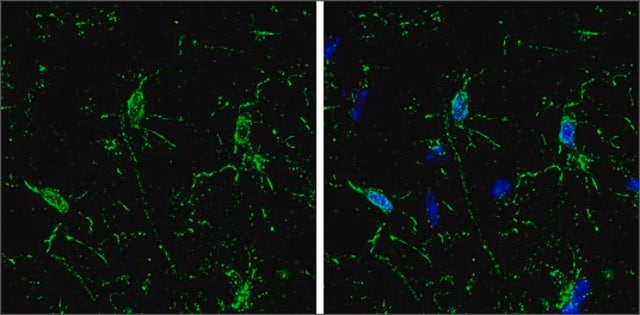E1518
Echistatin from Echis carinatus
lyophilized powder, γ-irradiated, BioXtra
Zaloguj sięWyświetlanie cen organizacyjnych i kontraktowych
About This Item
Polecane produkty
pochodzenie biologiczne
Echis carinatus
Poziom jakości
sterylność
γ-irradiated
linia produktu
BioXtra
Próba
>95% (SDS-PAGE)
Postać
lyophilized powder
masa cząsteczkowa
5.2-5.4 kDa
opakowanie
pkg of 50 μg
metody
cell culture | mammalian: suitable
rozpuszczalność
water: soluble 0.1 mg/mL, clear, colorless
Warunki transportu
ambient
temp. przechowywania
−20°C
Klucz InChI
XLBBKEHLEPNMMF-SSUNCQRMSA-N
Opis ogólny
Echistatin is a small peptide disintegrin that has no multiple epitopes. It is a single chain polypeptide with a molecular mass of 5400. Echistatin has eight cysteines and the sequence arginine glycine aspartic acid (RGD).
Zastosowanie
Echistatin from Echis carinatus has been used in diabetic rabbits grouping and treatment and murine iPSC (induced pluripotent stem cell) culture.
Działania biochem./fizjol.
Echistatin has the ability to prevent IRS-1 (insulin receptor substrate-1) phosphorylation induced by IGF-1 (insulin like growth factor-1). Echistatin α1, purified from the venom of the saw scaled viper, Echis carinatus has the capability to block platelet aggregation.
Disintegrins represent a novel family of integrin β1 and β3 inhibitor proteins isolated from viper venoms. They are low molecular-weight, cysteine-rich peptides containing the Arg-Gly-Asp (RGD) sequence. They are the most potent known inhibitors of integrin function. Disintegrins interfere with cell adhesion to the extracellular matrix, including adhesion of melanoma cells and fibroblasts to fibronectin, and are potent inhibitors of platelet aggregation.
This page may contain text that has been machine translated.
Kod klasy składowania
11 - Combustible Solids
Klasa zagrożenia wodnego (WGK)
WGK 3
Temperatura zapłonu (°F)
Not applicable
Temperatura zapłonu (°C)
Not applicable
Certyfikaty analizy (CoA)
Poszukaj Certyfikaty analizy (CoA), wpisując numer partii/serii produktów. Numery serii i partii można znaleźć na etykiecie produktu po słowach „seria” lub „partia”.
Masz już ten produkt?
Dokumenty związane z niedawno zakupionymi produktami zostały zamieszczone w Bibliotece dokumentów.
Klienci oglądali również te produkty
Fengbin Lin et al.
International journal of clinical and experimental pathology, 8(11), 14294-14304 (2016-01-30)
To investigate the effect of disintegrin echistatin on integrin linked kinase (ILK) and subsequent PI3-K/Akt and ERK1/2 signaling pathways in the posterior capsule opacification (PCO) model of diabetic rabbit. 56 rabbits were injected alloxan to model diabetic. Then they accepted
Echistatin prevents posterior capsule opacification in diabetic rabbit model via integrin linked kinase signaling pathway.
Lin F, et al.
International Journal of Clinical and Experimental Pathology, 8(11), 14294-14294 (2015)
Animal Toxins: Facts and Protocols (2013)
Ozge Er et al.
Applied biochemistry and biotechnology, 187(4), 1539-1550 (2018-10-03)
Snake venoms are a natural biological source that has potential therapeutic value with various protein compounds. Disintegrins originally were discovered as a family of proteins from snake venoms composed of cysteine rich low molecular weight polypeptides. Disintegrins exhibit specific binding
Insulin-like Growth Factor Receptor Signalling (2003)
Nasz zespół naukowców ma doświadczenie we wszystkich obszarach badań, w tym w naukach przyrodniczych, materiałoznawstwie, syntezie chemicznej, chromatografii, analityce i wielu innych dziedzinach.
Skontaktuj się z zespołem ds. pomocy technicznej








